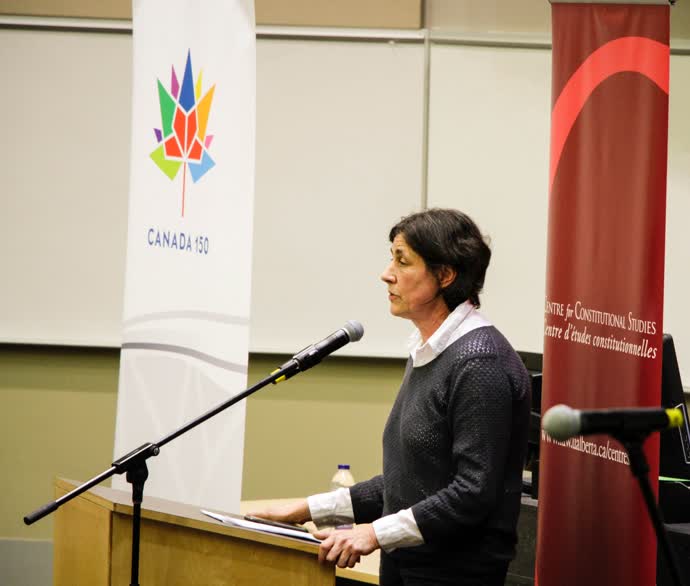
For nearly 25 years it was the single biggest topic of national debate in Canada. It reached a deafening crescendo between 1987 and 1995 from the thwarted Meech Lake and Charlottetown accords and the barely defeated 1995 Quebec sovereignty referendum. And then it vanished, and today remains a largely dormant issue for which few - if any - Canadian politicians have the slightest appetite.
On March 14 the Centre for Constitutional Studies welcomed acclaimed journalist and political pundit Chantal Hébert for a discussion on Canada's still-unsettled constitutional conundrum as part of the centre's 2017 lecture series, entitled Looking Back, Moving Forward: How the Constitution Shapes Canada.
In a talk entitled "Canada's Long Constitutional Sleep," Hébert, who rose to prominence as a political reporter for Montreal's La Presse in the lead-up to the 1995 referendum, revisited the failed 1987 and 1992 attempts at bringing Quebec into the constitutional fold - and the resultant near-breakup of Canada - and the issue's subsequent disappearance from the Canadian political landscape.
With her trademark wit and candour, Hébert drew a telling analogy between the spectacular failure of the 1992 Charlottetown Accord and the 2016 electoral victory of Donald Trump in the United States.
"In case you start to think we're somehow different here, it's worth looking back to 1992," she asserted.
"Charlottetown was a textbook example of a huge disconnect between the country's elites, nearly all of whom supported the Accord, and the Canadian people, who overwhelmingly opposed it. As with the Trump victory, Canada's political elites completely misread the mood of the country, and were punished for it."
Though the talk began with a revisiting of the constitutional dramas of the 1980s and 1990s, it mainly concerned the subsequent two decades, and how an issue that at one time had consumed the country - almost to the exclusion of any other issue - could have simply vanished, and its prospects for a return to the political forefront.
Hébert credits the Harper government in no small part for neutralizing the issue by way of the 2006 Québécois nation motion, which formally recognized Quebec as a "nation" within Canada.
"For many Quebecers this all but resolved the issue," she explained.
"For years Canadians had been wrestling over the notion of Quebec as a 'distinct society' and what those words even meant. The idea of 'nationhood' is important to many Quebecers for largely symbolic reasons, and the 2006 motion effectively gave them what they wanted with very little protest."
She also credits the legacy of the Charter of the French Language (Bill 101) for the issue's waning, largely in assuaging French-speaking Quebecers' fears for their future within Canada as well as setting the groundwork for Quebec's current reality as an increasingly multi-ethnic and multicultural, but unquestionably francophone, province.
"It's worth remembering that for a long time Bill 101 was extremely controversial, with even provincial Liberals in Quebec opposing it," she noted.
"But had it not been adopted, it's likely that francophone Quebec would have remained a small, isolated, overwhelmingly white minority surrounded by a multicultural anglophone majority. This is not what you see in Quebec today, and I believe you have to credit the Language Charter for that."
Otherwise, Hébert credits the abatement of the constitutional question to its simply being superseded by other concerns, ranging from globalization to climate change to the war on terror. In her view, while there remains a sizeable portion of the francophone population of Quebec with separatist leanings, the issue is simply no longer a priority, and no longer has the capacity to make or break an election. In addition, she notes that the country is in a very different place than it was in 1992 - on the whole far more cohesive - despite linguistic differences.
"We're all from everywhere now," said Hébert, herself a Franco-Ontarian who considers Montréal home, but considers herself equally at home in English Canada.
"Provincial identities are still strong, but not nearly as strong as they once were."
While she contends that most Canadians are more than happy to let this sleeping dog lie, Hébert asserts that Canada's ongoing "nothing to see here" attitude to the still-unsettled issue of Quebec's place in the Constitution has not been without its costs.
"There's definitely an argument to be made for reopening the issue," she said.
"One is Aboriginal self-rule. It's very difficult to reach any sort of national consensus around this without touching the Constitution. The other is Senate reform. Canada's Senate imbalance is one of the most glaring problems in our political system, and clearly doesn't reflect the country as it exists today, but again you can't rebalance the Senate without reopening the constitutional debate, and it seems clear that nobody wants to do that. Justin Trudeau has no appetite for constitutional renegotiations, and I don't think you'll see any pressure on him to do so."
Hébert concluded that she does not anticipate this particular sleeping dog rousing anytime soon, but that in today's topsy-turvy world of fake news and populist demagoguery, anything is possible.
"All I can say for certain is that I will never cover another constitutional debate or Quebec referendum."
For almost as long as there's been a Canada, there's been a University of Alberta. Over the next year, in honour of Canada's 150th anniversary, we're proudly celebrating the people, achievements and ideas that contributed to the making of a confederation.
